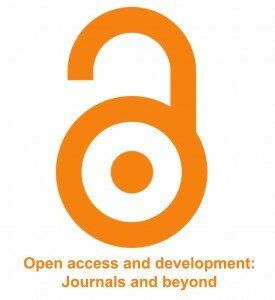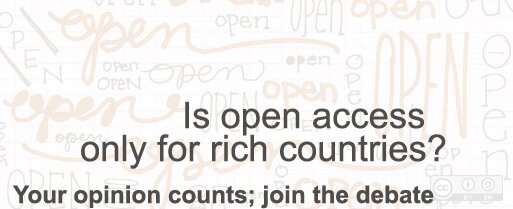Open Access Debates – get talking
Tuesday, November 20, 2012 17:53A series of interesting and thought-provoking debates is scheduled to launch on 27 November.
Funded by DFID and hosted on UNESCO’s WSIS Open Access Community Forum, the discussion will provide a valuable space to discuss different perspectives on what open access means for the developing world and what it can offer.
Register for the online discussions on the WSIS Open Access Knowledge Communities here. The discussion is found at the following link: http://bit.ly/TdUyHG. But please note that in order to post comments you will need to be registered as a user on the platform.
The kickoff topic for debate will be The production, publication and consumption of scholarly knowledge and OA.
The introductory debate will focus on the greater concern of scholarly research in the developing country context debating the questions:
• What does OA imply and offer the developing world in terms of production, publication and consumption of academic materials and research activities?
• What are the specific challenges and opportunities for access to knowledge in developing countries?
Within this topic will be the following sub-themes will be introduced:
- Sub-theme 1: Considering the issues of translation; co-production and increasing access to academic materials; and the importance of OA in producing and sharing of non-state-supported educational materials;
- Sub-theme 2: OA in academia and the search for global prestige; the perverse impact of metrics and rankings; scholarly knowledge production; and sharing and consumption challenges in developing countries.
Backgrounding open access
Open access has enjoyed a great deal of acceptance and growth over the last decade, with a particularly strong spurt in the adoption of open access policies by major agencies and governments in the last 12 months. With open access policies and initiatives now being taken up by UNESCO, the World Bank, the FAO, the European Commission, and the governments of the United Kingdom and the United States, it is clear that open access has entered the global mainstream.
We now know that open access can work in the immediate and short term in providing better access to the research literature, whilst some of the longer term consequences and effects are still emerging. This is especially so in the developing world, which has been badly served by the publishing system we have inherited from the 20th century new opportunities and possibilities are created by open access, and, at the same time certain pitfalls need to be noted and avoided.
A foundational report prepared to inform this dialogue shows the risks posed to all scholarly communications, discourse and practices by the publish-or-perish system, and indicates that in the developing world, the detriments are potentially much deeper and more damaging. As researchers are incentivised to publish in overseas-based journals – mostly unavailable in many developing world contexts – this research ‘brain-drain’ risks widening the gap between research and policy[1].
At the same time, it also puts localised research at risks – as researchers tend to do the types of research that are more likely to be published in core journals, they are less likely to undertake research that has a more local focus and application because their work is either considered to be only of local or regional interest or does not meet the quality standards required by the major commercial indexes[2]. These kinds of research, however, may be far more relevant than research from the richer countries, and may also be more applicable in other countries with similar socio-economic situations.[3] This potential for the loss of specialised, context-appropriate research is one of the key areas where an adoption of open access at a higher education policy level can have a potential to reverse the trend. In order for this to happen though, national research policies have to consider the communication aspect of scholarly activity and invest not only in the principles of open access, but also in developing the technical infrastructure and skills to support this.
There is another aspect to the publish-or-perish phenomenon, which needs to be borne in mind when considering the potential of open access to mitigate it – and that is that, while open access can relieve some of the financial burden that arises, it does not necessarily solve the problem of citation scores. In fact, a key irony of the development of open access in the global North is that it is increasingly being appropriated by the mainstream to justify publish-or-perish. Many researchers see publishing using open access as a way of increasing individual citations, and several journals have chosen to prominently publish their impact factors, which does little to decrease the marginalisation of research from the developing world. If researchers and academics from these countries really want to take full advantage of the power of open access to make their research visible globally and challenge the status quo, they need to take advantage of the power of networks and social media in order to bypass the traditional system of publishing and evaluation of the perceived “quality” of research[4]. This means creating kinds of impact metrics, particularly those which demonstrate the impact of research on development. In this context, the growth of open access journals in the developing world offers some very real opportunities for measuring and recording alternative impact. However, policymakers and funders need to be educated on this issue – not only in terms of open access, but in the light of the open source, open education and free culture movements as well, which when seen in a broader context, make a convincing argument for convergence in effort and collaboration.
Building Sustainable Funding Models
In many – but by no means all – open access models, the cost of publication is borne by the author. To date, one of the most common ways of managing the cost is to build it into the research funding, or for donors and funders to cover it. While these models are being tested at the moment, for many researchers in developing countries it still means that publication of local research, even in local open access journals, it still arbitrated by external bodies. In the long term, this can be overcome by the development of a more locally-focussed global knowledge commons, which encourages leverage of networked world we live in. It is well understood that phenomena such as disease and climate change are global and do not recognise borders, much less currencies. The exchange of knowledge across borders and the building of a global knowledge commons is increasingly important for solving problems that we all face. The funding of a global knowledge commons is a fraught and complex issue, but open access provides one tool for making the funding of the tools for exchanging information simpler and more equitable.
In many countries, and indeed in many international agencies, the power wielded by the commercial scholarly publishing lobby is still great. They are able to convince governments and agencies that their subscription donations are a viable alternative, and in many developing countries, they exploit the lack of coherent research development frameworks to further their market-driven purposes. Historically many universities in the developing world, emerging out of undemocratic systems needed to rebuild their research systems after the depredations of World Bank and IMF structural adjustment programmes. The focus in this recovery period tended to be on the need to rebuild prestige and so the policy focus and reward systems for researchers gave preference to publication in the big international commercial journals, with their high-impact ratings. However, many institutions in the developing world are increasingly attempting to leverage the potential for the development of scholarly publications that can contribute to their strategies for research contribution to national and local development imperatives. Open access offers an opportunity to make a significant difference at a policy level, which encourages dialogue among developing country research organisations, allowing them to reframe the focus of global open access policy initiatives, contributing to the debate rather than just playing follow-on.
[1] Van Dalen & Henkens
[2] Chan, Kirsop and Arunachalan
[3] Ibid
[4] Chan, Kirsop, Arunachalan
The above is courtesy Eve Gray, blogger, activist, consultant and academic. Read more at The Gray Area


